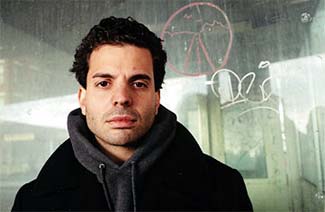Steven Delopoulos
Genre: Pop/Folk/Acoustic
Official Web Site
Steven Delopoulos Bibliography: (click on each album cover to view tracks and Steven Delopoulos lyrics)
Steven Delopoulos Biography 'Me Died Blue' is the eb+flo Records / Universal South debut of Steven Delopoulos, previously best known as the singer/rhythm guitarist/songwriter for Burlap To Cashmere, the internationally folkish group Delopoulos founded in New York during the late-'90s. (The album is an unusually accomplished piece of work that suggests Delopoulos as the strong heir to the great tradition of Northeastern singer-songwriterdom, a literate succession of emotional music stretching from Harry Chapin and Paul Simon, to Billy Joel and Bruce Springsteen and beyond.)
For Monroe Jones, eb+flo's label head, discovering Delopoulos and his music spawned the creation of his imprint label with Universal South and its Senior Partners Tim DuBois and Tony Brown. Jones, a Nashville-based producer and songwriter with experience in a wide array of styles, had considered beginning a label with DuBois and Brown. Jones had lacked, however, a label's most essential component: a world-class artist. For Jones, Delopoulous was exactly that. "During our first meeting," Jones recalls, "Steven played me 'Another Day', and as I heard the song, I found myself just trying to keep my composure; the more he got into it, the more I found myself leaning forward in my chair."
Delopoulous' music, indeed, possesses a rare sort of emotional addictiveness. Writing about personal landscapes marked by cheap parades and foreign dreams, melancholy friends and lost clouds, Delopoulos creates music with a definite past, a striking present and very promising future. It is impressionistic and anchored, both qualities replicated in Delopoulos' soulfully alert tenor.
"My story begins with my father moving from Greece to America," Delopoulos explains, "and meeting my mom and having me, this toddler with a dad who smoked cigarettes, worked in the kitchen, came back all greasy and threw on Greek music. My mom and dad loved listening to music, although my mom was more of the musical person, a piano teacher and choir director. My work now stems from Greek folk music, which is still immensely popular there, just as Paul Simon is still popular in America."
The Greek music he heard while quite young continues to haunt Delopoulos, 27. "We made pretty consistent trips to Greece when I was a toddler," he says. "The place was awash in acoustic guitars, female vocalists, these rootsy island-girl kinds of things. One of the songs my mom loved was a song whose name translates in English as 'Red Rose', a beautiful, beautiful traditional folk song. I kind of lost some of the Greek music, growing up, going to public schools. Yet a lot of those rhythms stuck with me. Many of my songs have the Greek rhythms and timings; 'Me Died Blue' is a heavily Greek-influenced song in this way. So there are Greek touches everywhere, hints of Greek playing, hints of that heritage." The spectacular "Holy Sunlight," with its atmospheric melodic architecture and skittery rhythms, skillfully modernizes this part of Delopoulos' sources; it suggests traditional Greek music as re-imagined by U2.
Growing up in Monmouth County, New Jersey, Delopoulos began to encounter music beyond his Greek Orthodox household. He experienced no standard rock-n-roll infatuation. He was never "a band guy," Delopoulos remembers, worshipping at the altar of Led Zeppelin, say, as did many of his '80s school peers. "The more songwriteresque, the better," he says of the bands that did catch his attention. "I thought, for example, that The Beatles were great, because they were melodic songwriters. Even Pink Floyd was more melodic." Confidently, Delopoulos kept "always sort of doing it my own way," as he puts it, heeding his own sense of things, his own ears. "I wasn't a Rolling Stones guy," he laughs, "nothing like that."
Still, Delopoulos says that, like so many high-schoolers drawn to forming bands, creative urges gripped him. "I loved to express," he recalls. "I wanted to express." Toward this end, he discovered two worlds, the personal conjunction of which would prove essential to Steven Delopoulos. Those worlds were American folk music, which he says "changed his life" and theater.
"Harry Chapin was my first huge, huge love," Delopoulos says. "I remember buying all his records, just flipping out, reading his biography-I was fascinated with Chapin's life and how he handled an audience and how he created his songs. He was a master writer and a really good storyteller. He'd even won a film award for a documentary he made in the '70s about boxing. By this point, I was playing guitar; I'd try to copy his songs. Before I knew it, I'd started trying to write on my own."
Out of all this came the Steven Delopoulos who, after majoring in theater at college, moved to New York, played coffeehouses and eventually founded Burlap To Cashmere. The band, building on an increasingly strong word-of-mouth following and fans who loved Delopoulous' internationally-accented music, eventually sold nearly half-a-million copies of their A&M debut. They toured heavily, playing concerts with Train, Hootie & the Blowfish and others. Out of all this-not to mention emerging from a long period of personal turmoil-comes the strong debut singer-songwriter of 'Me Died Blue'.
Delopoulos retains what he calls "a theater heart." He explains: "There's something about, say, a Cat Stevens song: You can almost picture a man onstage with a spotlight on him, singing OEmoon shadow. I think theater is the most noble action among attempts to get an audience. That's what moves me: theater and expressing: the true essence of expressing is a humble and noble act and nobody gets hurt. That's the beauty of theatre. Folk music became very political and in-your-face. Theater is the antidote to that.
It's presenting a story, which can bring you to a certain, different place. The combination is just great. I have a theater heart. I'm a cornball by nature, man. But I prefer creating-like songwriting-more than I like following a script. That's why I choose to sit in the studio and do this."
In high singer-songwriter style, the dozen songs on Me Died Blue capitalize richly on Delopoulos' particular and personal drive for expression. They range from harmonically stirring ballads such as "Jungle Trail" and "Here I Go"-music that manages to combine lush instrumentalism and stark emotions-to more upbeat sing-alongs such as "12 West Front St." and "Me Died Blue," which work lyrics, as well as "oh-oh-oh's" and "la-la-la's," into their own energetic rhythmic agents. On "Mediterranean Waters," Delopoulos casts his view all over the world, noting "Italian diamonds" and "French beauties." There's good, there's bad, there's tragedy, there's wonder-and, in this completely alive tune, there's hope for the future.
"I think that a lot of these songs represent my way of making sense of the fact that it's OK to be wherever you are, guilt-free," says Delopoulous. "The whole point of this album is dignity: I think the reason the world's in turmoil is because people are craving attention. I'm just trying to create my own theology, to get to a place that's equivalent to that one word, that one condition: dignity. That's the goal, to receive the blessing of being able to see yourself as whole."
|



